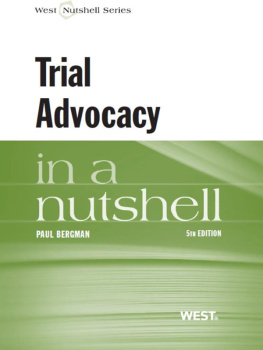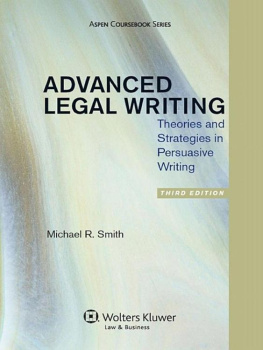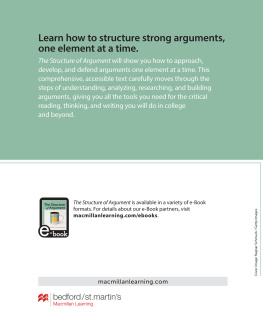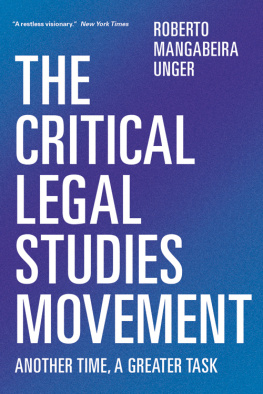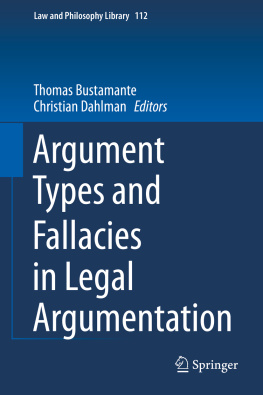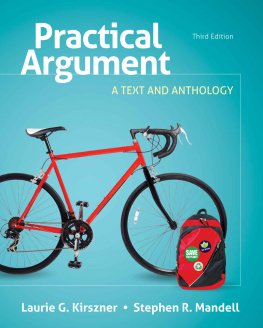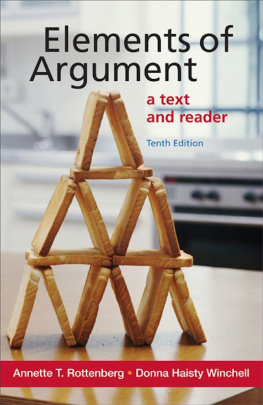The Five Types
of
Legal Argument
The Five Types
of
Legal Argument
THIRD EDITION
Wilson Huhn
C AROLINA A CADEMIC P RESS
Durham, North Carolina
Copyright 2008, 2014
Wilson Huhn
All Rights Reserved
Library of Congress Cataloging-in-Publication Data
Huhn, Wilson Ray, 1950 author.
The five types of legal argument / Wilson Huhn. -- Third edition.
pages cm
Includes bibliographical references and index.
ISBN 978-1-61163-588-1 (alk. paper)
1. Law--United States--Methodology. 2. Judicial process--United States. 3. Legal composition. 4. Persuasion (Rhetoric) I. Title.
KF380.H84 2014
340'.11--dc23
2014003985
Carolina Academic Press
700 Kent Street
Durham, NC 27701
Telephone (919) 489-7486
Fax (919) 493-5668
www.cap-press.com
Printed in the United States of America
for
Nancy, Jesse, Niki, Missy, and David
Contents
Preface
This book was written for students entering law school, so that from the first day they might appreciate what makes legal reasoning so fascinating and so difficult. I have presumed that the reader has a general knowledge of the American system of government and court system. I have used a sprinkling of specialized terms that are either defined in the text or that may be clarified by reference to a legal dictionary. It is my hope that this volume will also prove useful to attorneys and judges who may wish to consciously reflect upon the analytical skills that have become second nature to them.
This book is principally based on the article Teaching Legal Analysis Using a Pluralistic Model of Law , published at 36 G ONZAGA L AW R EVIEW 433 (2000/01) (copyright 2001 Gonzaga Law Review Association). It also contains substantial material from The Use and Limits of Syllogistic Reasoning in Briefing Cases , 42 S ANTA C LARA L AW R EVIEW 101 (2002). The editors of the Gonzaga Law Review and the Santa Clara Law Review made important contributions that improved the clarity and the accuracy of this work.
I would like to thank my editor, Melissa Ulrich, Assistant Professor and Lead Faculty, Paralegal Studies, at The University of Akron for her many improvements to the text. I am also grateful to Judge Sam Bell and to several of my colleagues at The University of Akron School of Law, including Dean Richard L. Aynes, Associate Deans Elizabeth Reilly and Malina Coleman, and Professors Jane Moriarty, Samuel Oddi, Richard Cohen, Tracy Thomas, William Jordan, and Lloyd Anderson, for their valuable substantive and editorial suggestions. Finally, I would like to thank my research assistants, Matthew Hudson and Patrick Walsh, for their invaluable assistance. All errors and material omissions are, of course, my sole responsibility.
Above all, I am indebted to my wife and children for their love and support, and I dedicate this book to them.
Wilson Huhn
Preface to the Second Edition
Among other changes, this edition of The Five Types of Legal Argument adds a new chapter, , setting forth a logical demonstration of the theory of the five types of legal arguments. This chapter demonstrates that the brief of a case takes the form of an argument of deductive logic, but that the different types of legal arguments are not the creatures of logic, but rather are the assumptions upon which all legal reasoning is based. This new chapter is based upon research originally published in the article The Use and Limits of Syllogistic Reasoning in Briefing Cases , 42 S ANTA C LARA L AW R EVIEW 813 (2002). I again wish to acknowledge the fine work of the editors and staff of the Santa Clara Law Review for their assistance in bringing that article to publication.
The most significant substantive change to the theory is contained in of this edition where I have added two additional types of intra-type attacks on legal arguments. The first change is that I have identified another method of attacking intent arguments, and it is exemplified in two speeches by Abraham Lincoln. In addition, I have described another way of attacking tradition arguments that was employed by Justice Anthony Kennedy in the case of Lawrence v. Texas .
This edition updates references to Regents v. Bakke and Bowers v. Hardwick in light of the 2003 decisions of the Supreme Court in Grutter v. Bollinger and Lawrence v. Texas . In particular, the newer cases make contributions to our understanding of how to make and attack arguments based upon precedent and tradition.
I am grateful to the many law students, law professors, lawyers, and judges who have found this book to be useful in their pursuit of a deeper understanding of and facility with legal reasoning, as well as to those many persons who have made helpful suggestions for improving this book.
Wilson Huhn
Preface to the Third Edition
The principal change that is made in the third edition of this book is the addition of a new chapter (now numbered ) describing how reasoning by analogy is the bridge between formalism and realism. The material in this new chapter will assist lawyers and judges to construct legal arguments in increasingly difficult cases. This chapter is a condensed version of the jurisprudential theory set forth in the article The Stages of Legal Reasoning: Formalism, Analogy, and Realism , 48 V ILLANOVA L AW R EVIEW 305380 (2003). I wish to acknowledge and thank the editors of the Villanova Law Review for their technical assistance and editorial advice that made many valuable improvements to that article, and hence to the new chapter of this book.
Other changes and clarifications are sprinkled throughout this new edition, yet the essential theme remains intact. Lawyers, judges, legal educators and law students construct legal arguments that follow certain patterns and that draw on characteristic types of data. These types of arguments may be classified under the categories of text, intent, precedent, tradition, and policy. This paradigm helps us both to understand the law and to practice the profession of law.
As always, I am grateful to my wife, Dr. Nancy Wollam-Huhn, for her love and support all these many years.
Wilson Huhn
February 14, 2014
INTRODUCTION
The Voices of the Law
The law is not smooth and pure like distilled water. It is instead a wild river, fed by tributaries which arise from myriad wellsprings. To master the law we must trace each and every legal argument to its source.
To use another image, the law speaks to us with different voices, and the greatest challenge we face in studying the law is to recognize and understand each of the voices of the law, and to express ourselves with every voice.
The most eloquent American jurist, Benjamin Nathan Cardozo, gave this description of the nature of the judicial process:
What is it that I do when I decide a case? To what sources of information do I appeal for guidance? In what proportions do I permit them to contribute to the result? In what proportions ought they to contribute? If a precedent is applicable, when do I refuse to follow it? If no precedent is applicable, how do I reach the rule that will make a precedent for the future? If I am seeking logical consistency, the symmetry of the legal structure, how far shall I seek it? At what point shall the quest be halted by some discrepant custom, by some consideration of the social welfare, by my own or the common standards of justice and morals? Into that strange compound which is brewed daily in the cauldron of the courts, all these ingredients enter in varying proportions.




